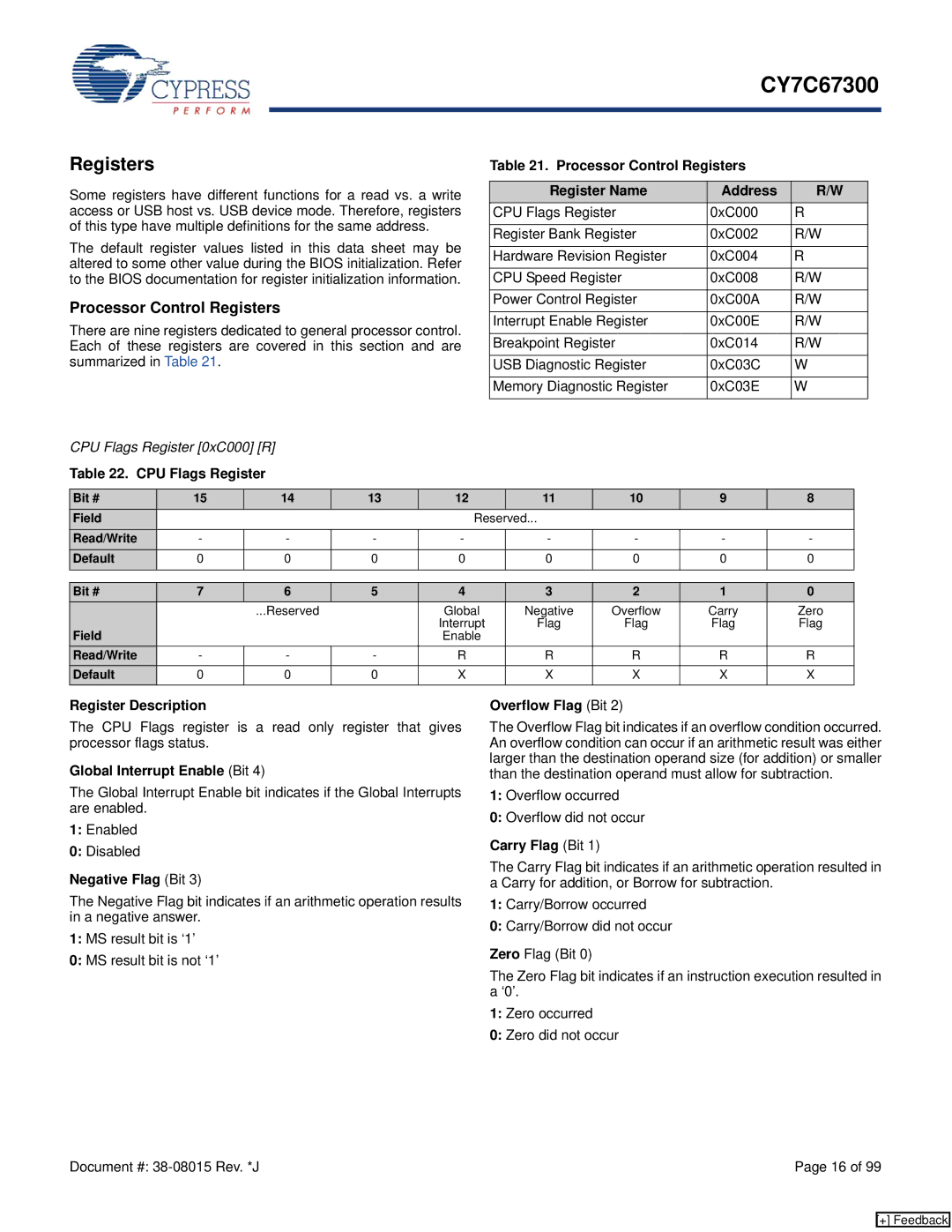
CY7C67300
Registers
Some registers have different functions for a read vs. a write access or USB host vs. USB device mode. Therefore, registers of this type have multiple definitions for the same address.
The default register values listed in this data sheet may be altered to some other value during the BIOS initialization. Refer to the BIOS documentation for register initialization information.
Processor Control Registers
There are nine registers dedicated to general processor control. Each of these registers are covered in this section and are summarized in Table 21.
CPU Flags Register [0xC000] [R]
Table 22. CPU Flags Register
Table 21. Processor Control Registers
Register Name | Address | R/W |
CPU Flags Register | 0xC000 | R |
|
|
|
Register Bank Register | 0xC002 | R/W |
|
|
|
Hardware Revision Register | 0xC004 | R |
|
|
|
CPU Speed Register | 0xC008 | R/W |
|
|
|
Power Control Register | 0xC00A | R/W |
|
|
|
Interrupt Enable Register | 0xC00E | R/W |
|
|
|
Breakpoint Register | 0xC014 | R/W |
|
|
|
USB Diagnostic Register | 0xC03C | W |
|
|
|
Memory Diagnostic Register | 0xC03E | W |
|
|
|
Bit # | 15 | 14 | 13 | 12 |
| 11 | 10 | 9 | 8 |
Field |
|
|
|
| Reserved... |
|
|
| |
Read/Write | - | - | - | - |
| - | - | - | - |
Default | 0 | 0 | 0 | 0 |
| 0 | 0 | 0 | 0 |
|
|
|
|
|
|
|
|
|
|
Bit # | 7 | 6 | 5 | 4 | 3 | 2 | 1 | 0 |
|
| ...Reserved |
| Global | Negative | Overflow | Carry | Zero |
Field |
|
|
| Interrupt | Flag | Flag | Flag | Flag |
|
|
| Enable |
|
|
|
| |
Read/Write | - | - | - | R | R | R | R | R |
Default | 0 | 0 | 0 | X | X | X | X | X |
Register Description
The CPU Flags register is a read only register that gives processor flags status.
Global Interrupt Enable (Bit 4)
The Global Interrupt Enable bit indicates if the Global Interrupts are enabled.
1:Enabled
0:Disabled
Negative Flag (Bit 3)
The Negative Flag bit indicates if an arithmetic operation results in a negative answer.
1:MS result bit is ‘1’
0:MS result bit is not ‘1’
Overflow Flag (Bit 2)
The Overflow Flag bit indicates if an overflow condition occurred. An overflow condition can occur if an arithmetic result was either larger than the destination operand size (for addition) or smaller than the destination operand must allow for subtraction.
1:Overflow occurred
0:Overflow did not occur
Carry Flag (Bit 1)
The Carry Flag bit indicates if an arithmetic operation resulted in a Carry for addition, or Borrow for subtraction.
1:Carry/Borrow occurred
0:Carry/Borrow did not occur
Zero Flag (Bit 0)
The Zero Flag bit indicates if an instruction execution resulted in a ‘0’.
1:Zero occurred
0:Zero did not occur
Document #: | Page 16 of 99 |
[+] Feedback
